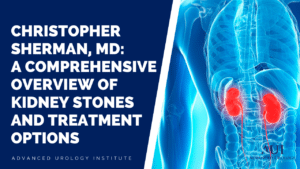Christopher Sherman, MD: A Comprehensive Overview of Kidney Stones and Treatment Options
Key Takeaways:
- Kidney stones can range in size from microscopic to sizeable calcifications that can block the kidney and cause severe pain.
- Treatment options for kidney stones are dependent on size and may include medications to pass stones naturally, shockwave lithotripsy to break the stones into small pieces, or a direct approach with a camera and laser.
- Advanced Urology Institute offers comprehensive and patient-centric care for individuals with kidney stones.
https://www.youtube.com/watch?v=n0q_6FKDA7E
 In the world of urology, not many names stand out as prominently as Dr. Christopher Sherman, a board-certified urologist based in Largo, FL. As a seasoned expert at Advanced Urology Institute, his insights on kidney stones and their treatment options provide a wealth of information for both patients and medical practitioners.
In the world of urology, not many names stand out as prominently as Dr. Christopher Sherman, a board-certified urologist based in Largo, FL. As a seasoned expert at Advanced Urology Institute, his insights on kidney stones and their treatment options provide a wealth of information for both patients and medical practitioners.
“I’m a board-certified urologist here at Advanced Urology Institute. Kidney stones are small or large calcifications that develop in the kidney,” states Dr. Sherman. Speaking of the condition with the knowledge and authority that his experience commands, he explains how kidney stones can range from microscopic to sizable calcifications that pose a severe threat when they block the kidney.
When Kidney Stones Cause Pain
Typically, patients become acutely aware of kidney stones when these formations move into the ureter and cause discomfort. “That’s when people would have pain, typically,” Dr. Sherman explains. This pain often escalates when the stones are of a particular size, leading to the necessity of medical intervention.
“If it’s a certain size, the stone may get stuck and may cause a lot of pain. And sometimes we have to do surgical procedures to remove them,” he remarks. But not all kidney stones demand surgical intervention; size plays a critical determining factor in the treatment route taken.
Determining the Appropriate Treatment
Dr. Sherman expounds, “So based on the size of the stone, sometimes people can pass them on their own with the help of some different medications.” In cases where the stones are small enough and the pain manageable, passing them naturally becomes feasible, reducing the need for aggressive intervention.
When the stones are larger, however, the treatment strategy shifts. An external procedure known as shockwave lithotripsy can break the stones into small pieces, allowing the body to pass them naturally. “Sometimes we can break it up from the outside using something called shockwave lithotripsy, which breaks up the stone and lets it pass on its own,” Dr. Sherman notes.
In certain cases, when shockwave lithotripsy is not possible or ineffective, the approach becomes more direct. Dr. Sherman comments, “Then we can go up with a camera and laser the stone into small pieces and pull them out directly”.
Trusting Advanced Urology Institute
Choosing the right urologist when dealing with kidney stones is crucial not only for effective treatment but also for peace of mind. This is where the Advanced Urology Institute comes in. As the medical home of Dr. Christopher Sherman and serving as the largest urology practice in Florida, it offers unparalleled care and expertise for patients struggling with kidney stones.
At the Advanced Urology Institute, each patient is treated with a customized, patient-centric approach, applying the most suitable treatment option based on the size and nature of their kidney stones. Trust Advanced Urology Institute for a comprehensive, empathetic, and effective approach to managing kidney stones. After all, you deserve nothing but the best when it comes to your health.
References:
- Kidney Stones | Advanced Urology Institute. (2023, June 7). Advanced Urology Institute. https://www.advancedurologyinstitute.com/conditions-we-treat/kidney-stones/
- Advanced Urology Institute. (2022, October 14). 7 Signs You Might Have Kidney Stones | Advanced Urology Institute. Advanced Urology Institute. https://www.advancedurologyinstitute.com/7-signs-you-might-have-kidney-stones/
- Kidney Stones. (2021, December 13). National Kidney Foundation; https://www.kidney.org/atoz/content/kidneystones
- NIDDK (2023, September 8). Kidney Stones – NIDDK. National Institute of Diabetes and Digestive and Kidney Diseases. https://www.niddk.nih.gov/health-information/urologic-diseases/kidney-stones
- Healthline (2018, December 5). Everything You Need to Know About Kidney Stones. Healthline; Healthline Media. https://www.healthline.com/health/kidney-stones
-
Lithotripsy: MedlinePlus Medical Encyclopedia. (2020). Medlineplus.gov. https://medlineplus.gov/ency/article/007113.htm
Transcription:
Hello, my name is Dr. Christopher Sherman. I’m a board-certified urologist here at Advanced Urology Institute. Well, kidney stones, they’re small or can be large calcifications that develop in the kidney. And what happens is they pass into the ureter and can block the kidney. And that’s when people would have pain, typically. If it’s a certain size, the stone may get stuck and may cause a lot of pain. And sometimes we have to do surgical procedures to remove them. Sometimes if they’re small enough, people can pass them on their own. So based on the size of the stone, sometimes people can pass them on their own with the help of some different medications. If they’re too large, sometimes we can break it up from the outside using something called shockwave lithotripsy, which breaks up the stone and lets it pass on its own. If that is not possible or is not effective, then we can go up with a camera and laser the stone into small pieces and pull them out directly.

